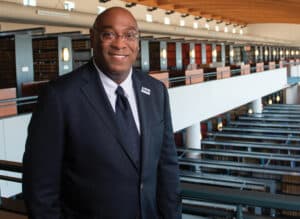2 questions with Drake Law School Dean Designate Roscoe Jones Jr.
How AI and increased diversity will affect the teaching and practice of law

In a recent Closer Look Q&A with the Business Record, Roscoe Jones Jr., dean designate of the Drake Law School, discussed his vision for the legal program, the school’s legacy and the precedent and meaning of being the Des Moines-based private university’s first Black dean.

During the interview, the 46-year-old public policy attorney also discussed how both incorporating artificial intelligence and the U.S. Supreme Court’s decision on affirmative action in college admission in Students for Fair Admissions Inc. v. President & Fellows of Harvard College (Harvard) and SFFA v. University of North Carolina will change law schools and the legal profession.
The following excerpt from Jones’ interview with the Business Record was lightly edited for brevity and clarity.
What are you seeing right now in the legal profession or in law and policy that you think is going to change the practice of law in the coming years?
There’s a couple of different things. Let’s start first with artificial intelligence. I think it’s the gift that keeps on giving. AI is going to change every industry, but particularly, I think we’re going to feel that in the legal industry and in law schools in a couple of ways. It’s not just about the question of fairness, making sure that, “Hey, is this work coming from our students or is this AI-generated,” but it’s also about creating opportunities. They’re going to be now training to enter a world where AI is going to dictate a lot of their research. Many of the things that we’ve been doing by hand or by computer or Westlaw or Lexis, they’re now going to have AI to do it. That comes with some challenges, particularly in terms of what role is there for humans, right? But it also comes with opportunities because they’re going to be able to do things much faster than before.
Think about the promises of AI for agriculture, for example. Many of our students will go to small firms. They’re not going to big, large firms. Many of them go to solo practitioners or medium to small-sized law firms. And many go to small areas. If AI can supplement their work and their staff to provide a larger impact into rural areas, that is a huge good. So, there are tons of opportunities with AI. Some law school is going to be known as the AI law school. Why not Drake Law School? Look, the East and West Coasts are going to do what they do in terms of AI in their own unique context. We have a unique context in Iowa, particularly thinking about small towns or rural areas, places where many of our students and alums go. Is there a way that we can utilize AI in a practical way to be more impactful in the Midwest context? I think that’s a great opportunity for us. So that’s one.
A second, I think, is going to be diversity. We’ve had a recent Supreme Court decision on diversity that’s going to make it more challenging for many schools to fulfill their missions. And we’re going to respect that Supreme Court decision, but we still have a mission and an ethos of thinking about, within the bounds of the law, how can we be a diverse institution. I think that, in my opinion, and the opinions of many other deans, there’s no dichotomy between student success and excellence and diversity. They all go hand in hand. You can’t have an excellent learning environment without diversity. Our students need to hear a different perspective. That’s part of the learning process – we learn from each other. And many of our students will go into a world where their clients, their colleagues, judges they go before are going to be very diverse actors. Our job is to prepare them for the realities of the world that they’re going to enter. So diversity is critical to what we do. I think we have to be more aggressive in recruiting. I am not an expert on the Supreme Court’s decision, but my read of it is that it allows a lot of room for law schools to be forward-leaning on recruiting.
How do you continue to strive for that diversity in recruitment while still respecting the law?
I think we have to go to where the students are, we can’t expect students to just come to us. One of the things that I would love to do in my tenure is to maybe do a tour of historically Black and Latino higher education institutions – that we go to them. Look, I think Drake is one of the best-kept secrets in legal education. I really do. When you think about affordability, we’re one of the cheaper law schools in the country. When you think about success outcomes, over 90% of our students are passing the bar and over 95% are getting employed, when you think about legal employment and general employment as well. Those are tremendous numbers that compete with almost anyone in the country. How do we tell our story to students so that they know who we are? One of my biggest challenges as a dean is to expand our brand. People in Iowa know us, people in the Midwest may know us. I want to make sure people in the East, the West and also in the South also know who we are, and that can also help us with diversity. The larger the pool, the more likely we can have a diverse class.

Mike Mendenhall
Mike Mendenhall is associate editor at Business Record. He covers economic development, government policy and law.










